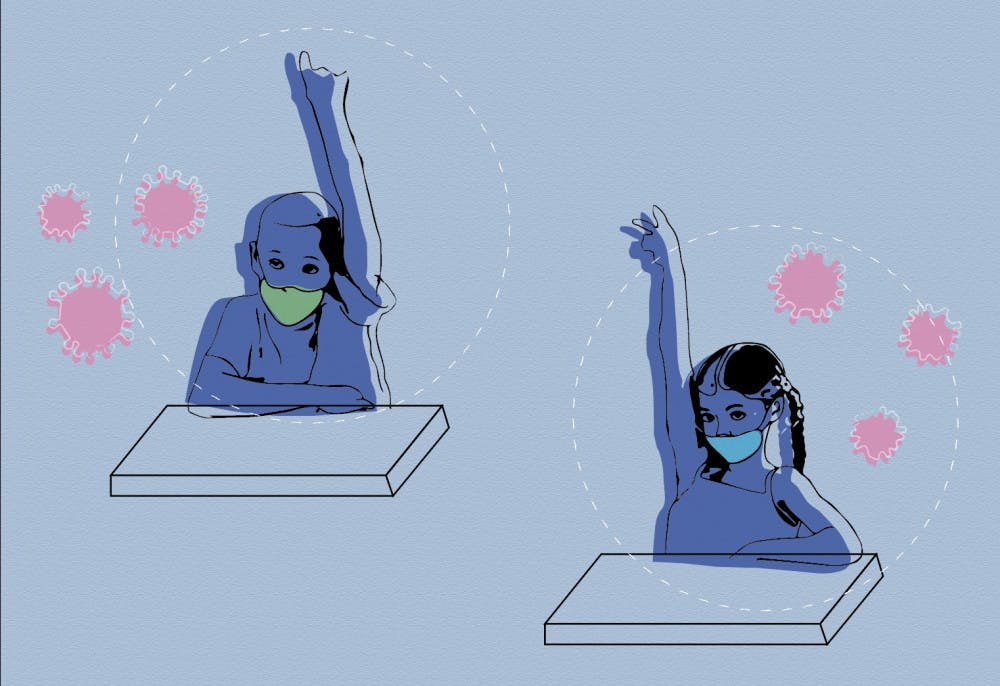When it was finally safe to return to grocery stores after the COVID-19 lockdown, Laura Holmes took her 5-year-old twins to Publix. Sitting side by side in their race-car cart, the twins ducked at the sound of the store’s public address system. Curiously, they stared at other customers walking by, and Holmes realized her children — born in 2018 — had missed many of their formative moments because of the pandemic.
Her twins didn’t understand the concept of a PA system and elevators. They are still battling with the idea of escalators. But more importantly, Holmes said they also missed out on developmental school years. Holmes has witnessed firsthand the effects of the COVID-19 pandemic, both as a Gainesville mother of three and as a pediatric occupational therapist at Fundamental Therapy Solutions.
About 61% of kindergarten through 12th-grade parents in the United States said the first year of the coronavirus pandemic had a negative impact on their child’s education, according to a Pew Research Center study.
“My kindergarteners, now, are not at the same place academically that my oldest son was despite doing everything kind of the same,” Holmes said. “He was writing pretty proficiently when he was in kindergarten and my twins, their letters are not great.”
Her eldest son was a strong reader in kindergarten, while her twins are “emerging readers,” as Holmes described them. They can read short words and basic sight words, the words schools expect students to recognize immediately. Her eighth-grader attended day care as a child, which is the only difference between her eighth grader and twins’ upbringings, Holmes said.
Of that 61% of parents in the Pew study, 56% said the impact was temporary — Holmes agrees. Her eighth-grader struggled with focus when schools went virtual, but he is showing strong studying and test-taking skills, she said.
“That was very hard for him to stay motivated — keep his camera on, follow the material that was there, and listen to the conversations just sitting in his chair, for hours and hours a day,” she said.
From a professional point, Holmes has seen an influx of referrals for occupational therapy. She works with children to develop their sensory and social skills, she said. There’s also been an increase in aggressive behavior.
Tantrums are more common in 5-year-olds than they used to be, but the reason why is still slightly unknown, Holmes said. At home, a child’s environment can be very comfortable, and without the experiences of grocery shopping, day care or other worldly exposures, it can be hard to process situations they’ve never experienced.
“We're seeing even more kiddos coming in with concerns for social skills and a lot of concerns about aggression and aggressive behaviors, and I think that's difficulty with coping skills that we're really seeing,” she said.
Frank Mackritis, St. Patrick Interparish School principal, notes a decrease in social skills, too. Conflict resolution has become an issue, and he's dedicated time toward getting students to agree to disagree, he said.
“When I'm talking about fine motor skills, I'm also talking about communication skills, the ability to sit and have a conversation with somebody, the ability to do an interview, the ability to look somebody in the eye when you're talking to them — those skills deteriorated even further during the time of COVID,” he said. “And it's something that we try to work on as a school.”
In addition to decreased conversational skills, he’s observed attention and comprehension struggles, he said.
“We found out, during COVID, some very valuable lessons,” he said. “One is you can't put a child in front of a computer for six hours. It's ineffective.”
There are two groups of students in his school: pre-pandemic students and post-pandemic students. Students born before or during the pandemic — now in kindergarten, first and second grade — are staying on track with school, do not have any unordinary focus issues and have strong conversation skills.
Students now in the third, fourth and fifth grade, who spent a year learning from home, are struggling to read, converse and are testing nearly an entire year behind their grade level, Mackritis said.
“The whole idea of ‘let's learn online’ sounded good, but it was probably the most ineffective year that we've ever had as a nation, as far as educating our children,” he said. “Brick and mortar is the way to go.”
Students lost nearly a year of reading and math comprehension to the pandemic, according to Education Week. Average math scores fell 0.20-0.27 standard deviations and reading scores fell 0.09-0.18 standard deviations lower compared to 2019 tests scores, Brookings reports.
The pandemic also caused an increase of speech therapy referrals, said Amy Tomlinson, a certified speech language pathologist. Fundamental Therapy Solutions, the private clinic Tomlinson owns in Gainesville, offers a wide range of services around occupational and speech therapy, among other types of therapy services. Speech language pathologists tackle more than basic communication skills — they help develop articulation, expressive receptive language delays, feeding habits, reading, dyslexia and stuttering.
Young children missed the visual cues that go into speech development during the pandemic, Tomlinson said.
“Developmentally, babies and toddlers learn a lot from just watching your mouth, feeling your mouth, and they didn't have that or they had a lot less of that,” she said.
Children are making progress in their development, Tomlinson said. She noted it’s harder to catch up rather than develop at a normal pace, and she’s seeing patients that are delayed years because of those missed early milestones.
The number of patients at Fundamental Therapy Solutions has skyrocketed and group services are getting bigger, she said, but it’s become harder to get access to services as more and more people get waitlisted at clinics. The caseloads Tomlinson takes on at schools in Alachua County have also increased.
“I know that it's increased,” Tomlinson said. “I can feel it because I'm in the trenches. I know that the delays are real. The lack of socialization was detrimental.”
Contact Ella at ethompson@alligator.org. Follow her on Twitter @elladeethompson.
Ella Thompson is the Spring 2025 Editor-in-Chief and a fourth-year journalism major. She also worked as the Fall 2024 Digital Managing Editor and the Spring 2024 metro editor. In her free time, she can be found reading, planning a trip or journaling.






